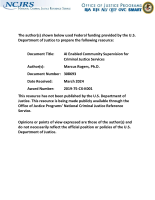Community justice
SNPs for Individual Identification
Incapacitated, Forcible, and Drug/Alcohol-Facilitated Rape in Relation to Binge Drinking, Marijuana Use, and Illicit Drug Use: A National Survey
Identification of smartphone-image source and manipulation
A gonosomal marker multiplex to aid in mixture interpretation
Forcible, Drug-Facilitated, and Incapacitated Rape in Relation to Substance Use Problems: Results from a National Sample of College Women
An efficient clustering-based retrieval framework for real crime scene footwear marks
Application of the scientific method to skeletal biology
Community Court Grows in Brooklyn: A Comprehensive Evaluation of the Red Hook Community Justice Center, Final Report
Out of home placement location and juvenile delinquency: The investigation of neighborhood impact on child welfare population's juvenile justice involvement
National Juvenile Data Analysis Program: Final Research Report
Beyond Community Policing: Community Justice
Salt Lake City's Comprehensive Communities Pregram: A Case Study
Eastside Substance Abuse Awareness Program Evaluation: First Interim Report
Targeted-Ion Mass Spectrometry for the Identification of Forensically Relevant Biological Fluids and Samples from Sexual Assault Evidence
Advancing Justice for the Missing and Unidentified Through Research - 2024 NIJ Research Conference
Forensic science research is developing essential knowledge to fill in the holes in death investigations, creating new ways to identify challenging skeletal remains. These methods inform cause of death, time of death, and familial relationships to guide investigations, identify suspects, support prosecutions, and bring justice to families.
See the YouTube Terms of Service and Google Privacy Policy




